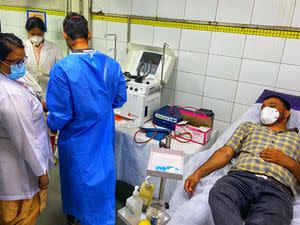Coronavirus: Indian families search for blood plasma donors to help treat loved ones with COVID-19
<p>Former military captain Mukesh Gombar, 69, had been admitted to a Delhi hospital after testing positive for <strong><a href="https://news.sky.com/topic/covid-19-8518" target="_blank">COVID-19</a></strong>.</p><p>Doctors had asked the family to organise plasma therapy when Mr Gombar's condition began to get worse.</p><p>Kanupriya told Sky News: "We had no means and started calling and sending messages on social media.</p><p>"My family were on the phone pretty much for the next two days trying to organise a donor. We were running from pillar to post find donors.</p><p>"On the fifth day at 4am they transfused plasma in him and within six to eight hours my father told us he was much better and that his breathing improved. It was combined with various other medication which was also going on."</p><p>Mr Gombar is one of the many hundreds of people across India that have had plasma therapy for COVID-19.</p><p>Patients whose own immune systems struggle to fight the virus are transfused with antibody-rich plasma from donors who have recovered.</p><p>The plasma match has to go through a rigorous check between the donor and recipient. Convalescent plasma is known to have been used during the Spanish flu pandemic back in 1918 and has been also used to treat Ebola.</p><p>Plasma therapy has been going on for months at the Lok Nayak Jai Prakash Narayan Hospital in Delhi.</p><p>The hospital is one of the biggest COVID-19 health facilities in the country.</p><p>Dr Suresh Kumar, the director of the hospital, told Sky News: "This plasma has a lot of protective antibodies that actually kills the virus and helps eradicate the virus from the human body.</p><p>"The patient recovers and this is proven. It saves lives."</p><p>But hospitals struggle to get enough donors as many recovered patients are unwilling to make trips again to hospitals for check-ups and donation.</p><p>The hospitals therefore organise camps encouraging recovered patients and tagging them as heroes.</p><p>Bhanu Sharma, 27, contracted the disease while working in an intensive unit of a COVID-19 ward.</p><p>He said: "I saw how lives were being saved by plasma therapy while working in the ICU, and patients recovered. I got inspired. I want my plasma to save lives."</p> <p>The Indian Council of Medical Research (ICMR), the country's apex body for biomedical research is not supportive of this treatment.</p><p>It organised the largest randomised control study of plasma therapy on 464 patients at 39 hospitals across the country.</p><p>Professor Balram Bhargava, the director general of ICMR, told Sky News: "For any disease, (to know) whether a medication is working (to treat it) we need to have what is called the 'gold standard' randomised control trials.</p><p>"But whatever that was expected to be has not been borne out in this randomised control trial.</p><p>"It did not show any benefit in terms of mortality or progression of severe disease. As far as this study is concerned and this being a fairly well powered study."</p><p>The US Food and Drug Administration granted an emergency use authorisation for plasma treatment on 23 August.</p> <p>It said initial trials indicate it is safe, although more are needed to prove effectiveness.</p><p>US President Donald Trump described the procedure as a powerful therapy, as he appealed to Americans to come forward to donate plasma if they had recovered from COVID-19.</p><p>Dr Suresh Kumar told Sky News: "We have used medicines like ramdesvir, hydrooxycholoroquine and azithromycin, but the result of plasma therapy is much much better than others."</p><p>But Prof Bhargava said: "This trial has been submitted to the British Medical Journal for review, it is under review and is not yet published, we have a pre-print published at the moment and this trial clearly demonstrates that there is no benefit of plasma therapy."</p><p>But many like Mr Gombar believe plasma saved their life. Anguished at their own experience, Kanupriya, her husband Adwitya and their friend Mukul, based in London, started a website called Dhoondh.com which connects beneficiaries with donors.</p> <p>Kanupriya said: "We realised that we are not alone in this there are probably tens of hundreds of people who were looking for plasma as well, and that's when the idea of Dhoondh came about.</p><p>"So we built this website within five days. We thought we would just help a few people. We didn't expect it to go viral and but the situation was so crazy."</p><p>India is the second worst affected country with more than 5.5 million cases, according to the Johns Hopkins University which is tracking the virus.</p><p>The country has the fastest infection rate in the world.</p><p>Though the fatality rate is one of the lowest in the world, over 90,000 people have died so far.</p><p>And until there is a vaccine, all medication is on the table for desperate families who believe plasma therapy may just be that silver bullet.</p>

 Yahoo News
Yahoo News 




